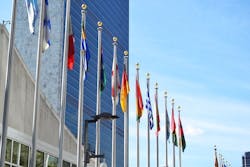World Bank and U.N. Claim 40% of World Population Affected by Water Scarcity
The World Bank and the U.N. have released a new joint report claiming that 40% of the world’s population is currently affected by water scarcity. The study was conducted over a two-year period. Other findings claim that 700 million people are at risk of being displaced due to water scarcity by 2030, more than two billion people are compelled to consume unsafe drinking water and more than 4.5 billion people are subjected to unsafe sanitation services.
“The ecosystems on which life itself is based-- our food security, energy sustainability, public health, jobs, cities-- are all at risk because of how water is managed today,” said Jim Yong Kim, World Bank Group President. “The world can no longer afford to take water for granted.”
The report comes in the midst of pressing water concerns in South Africa, where Cape Town may become the first major city to run out of water. Recent reports appear hopeful for the situation, however, and “Day Zero” is likely not to arrive until 2019 despite earlier date placements.
Many experts expect wars to be fought over water throughout the 21st century, citing an increasing demand for fresh drinking water as well as water for use in growing food.
“The problems of water are many, like more intense droughts caused by climate change, such as the one that parts of East Africa is experiencing now,” said Dan Shepard, an information officer with the U.N. Department of Public Information. “And then there is water mismangement, allocation and inadequate infrastructure.”
Areas of the U.S. and also Canada are already experiencing pressing shortages leading to significant action.
